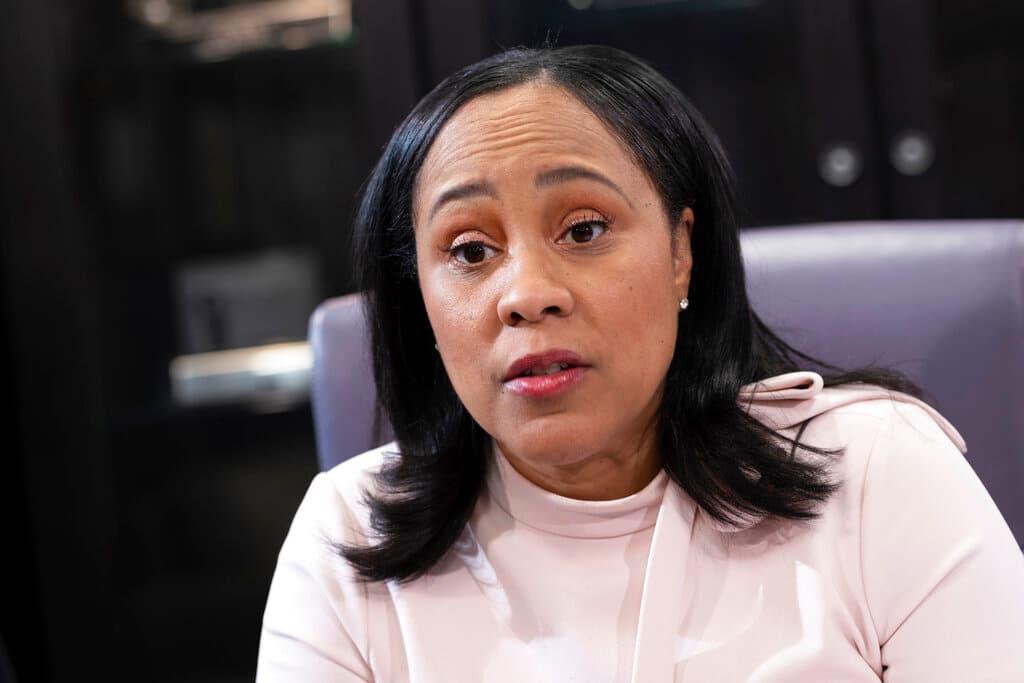Fani Willis Denounces Georgia Attorney General Who Urged Court To Ignore Her Appeal of Her Disqualification From Trump Case
If the Georgia supreme court fails to hear her appeal, she might be out of luck.

The Fulton County district attorney, Fani Willis, is excoriating Georgia’s attorney general for encouraging the state’s supreme court to ignore her appeal of her disqualification from her case against President Trump. She’s likely well aware that her appeal is no guarantee that she’ll have her day before a court with the power of discretionary review.
The attorney general, Chris Carr, this week took to X to “encourage the Georgia Supreme Court to not take” Ms. Willis’s appeal. “It’s our hope that the DA will now focus taxpayer resources on the successful prosecution of violent criminals in Fulton County.” If the Georgia supreme court does not take up the case, Ms. Willis and her office will remain disqualified, which would greatly imperil the prosecution.
Mr. Carr, who is running for governor, also wrote that “the Georgia Court of Appeals has ruled that the Fulton County DA created her own conflict and rightfully removed her from the case against President-elect Trump. ‘Lawfare’ has become far too common in American politics, and it must end.”
Ms. Willis, in a statement obtained by the Atlanta Journal-Constitution, declared that if “Mr. Carr cannot separate his ambition to become Governor from his duties as Attorney General, he should resign and focus on being a full-time candidate rather than serving as a constitutional officer sworn to uphold the Constitutions and laws of the United States and Georgia.”
Ms. Willis’s petition comes to the Georgia supreme court after a panel of the Georgia court of appeals, by a 2-to-1 margin, ruled that purging her from the case was the only route to remedy the “significant appearance of impropriety” created by her secret romance with her handpicked special prosecutor, Nathan Wade.
The district attorney persuaded the trial court judge, Scott McAfee, that the conflict of interest presented by the affair did not require disqualification. Judge McAfee instead mandated that Mr. Wade, who was hired despite never having prosecuted a felony, depart the case. Still, he criticized Ms. Willis for conduct that emitted an “odor of mendacity” and comments he called “legally improper.”
The appeals court, though, overturned that ruling and determined that Judge McAfee has not gone far enough because his decision did “nothing to address the appearance of impropriety that existed at times when DA Willis was exercising her broad pretrial discretion about who to prosecute and what charges to bring.”
The court acknowledged disqualification is “rare,” but found it earned in this case to “restore public confidence in the integrity of these proceedings.” The appellate judges, though, declined to mandate the more “extreme” remedy of dismissing the charges.
Ms. Willis immediately filed notice of her intent to appeal that ruling, but the Georgia supreme court enjoys the power of discretionary review, meaning it can choose its own cases. That rhymes with the prerogatives of the United States Supreme Court, which when exercising its appellate jurisdiction enjoys broad latitude to choose which cases it intends to hear, courtesy of the Certiorari Act of 1925.
Ms. Willis will be required to fill out an application to the Peach State’s highest court — and pay $310 in fees. She will have to complete that paperwork this month, and provide “a concise jurisdictional statement and an enumeration of errors.” Georgia law mandates that the “application for discretionary appeal will be considered by the Court without oral argument.”
As Ms. Willis crafts her appeal, she is likely to lean on the lone dissenter to the ruling disqualifying her from prosecuting the racketeering case she brought. Judge Benjamin Land, a Republican, writes that he is “particularly troubled by the fact that the majority has taken what has long been a discretionary decision for the trial court to make and converted it to something else entirely.”
Judge Land writes that the ruling by his colleagues “violates well-established precedent, threatens the discretion given to trial courts, and blurs the distinction between our respective courts.” That sounds like it is written for the ears of the state supreme court judges, eight of whom were appointed by Republican governors and one of whom was elected in a nonpartisan election.
If Ms. Willis loses at the Georgia supreme court, she could eye a further appeal to the United States Supreme Court. The Nine can only reach for review of “final judgments or decrees rendered by the highest court of a State” — like Georgia’s supreme court. There also needs to be a federal question at stake rather than a mere dispute over state law.
Trump’s erstwhile chief of staff, Mark Meadows — also charged by Ms. Willis — tried and failed to convince the Supreme Court that the prosecution encroached on federal interests.

